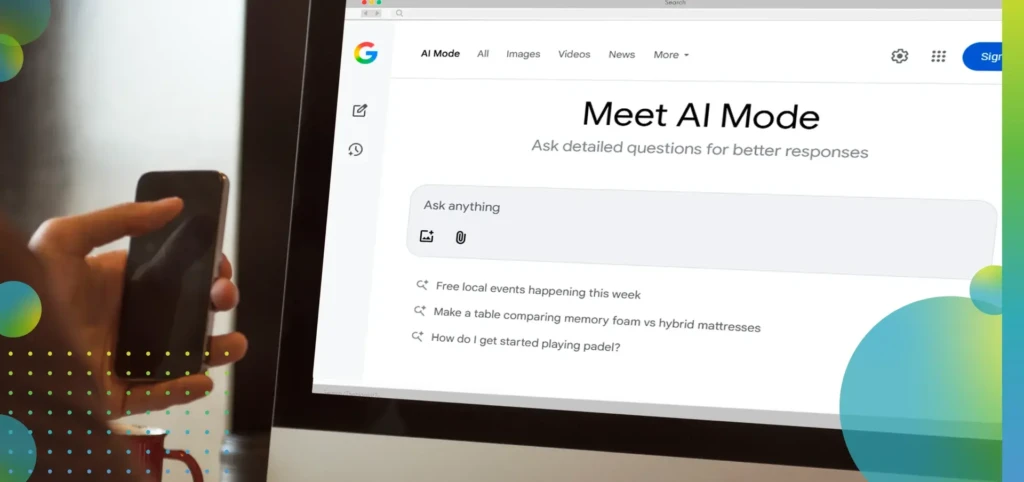The search landscape is changing faster than most businesses can adapt. Google’s AI Overviews now appear in over 13% of all search queries as of January 2025, with that number doubling every few months and reaching over 50% in some categories.
Traditional SEO has dominated for over two decades, but the rise of AI-powered search is fundamentally shifting how content is discovered and ranked.
For small businesses that depend on local search visibility, this is a complete transformation of how customers discover and choose services.
Generative AI and generative search are now driving this transformation, requiring new approaches to content creation and SEO to remain visible in AI-driven search environments.
While many business owners worry that AI will eliminate their visibility entirely, the reality is more nuanced. Companies that get AI-powered search right are actually seeing traffic increases of up to 60% while their competitors struggle with declining clicks. The winning move lies in adapting your clients’ content strategy to work with AI systems rather than against them.
In this guide, we’ll uncover the nuances of AI SEO strategies for 2026, and how you can position these services as must-have solutions that keep your clients ahead of the curve while building your recurring revenue.
- Introduction to AI Search
- Understanding Generative Engines
- Getting Into the AI Search Revolution: The Numbers That Matter for Small Businesses
- The Four Pillars of AI Search Optimization for Small Businesses
- Small Business Action Plan: Your 90-Day Client Onboarding Process
- Measuring & Demonstrating ROI for Your AI Services
- Future-Proofing Your Small Business for Continued AI Evolution

Introduction to AI Search
AI’s rise in the search world has brought big changes for both you and your business. We’re seeing AI search (powered by those advanced language models and generative engines) completely change how you’ll interact with search engines.
Instead of just getting a list of links, AI search engines like Google’s AI Overviews now give you direct answers, personalized recommendations, and results that actually match what you’re looking for.
This shift has created new ways we can help you optimize, and the big one we’re talking about is Generative Engine Optimization (GEO). GEO’s all about making sure your content becomes the go-to source for AI systems, so when AI generates responses, it’s citing your business.
At the same time, things like E-E-A-T (that’s Experience, Expertise, Authoritativeness, and Trustworthiness) and AI SEO are becoming must-haves if you want to stay ahead in the new era of digital marketing.
Major benefits of AI-powered search:
- Fast answers with less browsing
- Personalized results based on context
- Fewer clicks, more trust in presented information
Understanding Generative Engines
Generative engines, like Google’s AI mode, are changing how we search by moving beyond those traditional blue links we’re all used to. These advanced systems use natural language processing and machine learning to create responses that feel like real conversations, giving you direct, relevant answers to what you’re looking for.
You won’t find these engines just listing websites like the old search systems do. Instead, they focus on delivering direct answers and AI-generated responses that address what you actually want to know right away.
This means you’re less likely to click through multiple links and more likely to trust the information that’s provided directly in the search results. For businesses, this shift has major implications for how your brand gets seen and how you approach SEO.
To succeed in this environment, you’ll need to create content that’s easily understood by AI, structured for natural language queries, and optimized to be featured in AI-generated responses.

Getting Into the AI Search Revolution: The Numbers That Matter for Small Businesses
The statistics paint a clear picture of where search is heading, and why your clients need you now more than ever. Google’s AI Overviews reached 2 billion monthly users by July 2025, while AI Mode, Google’s conversational search experience, has over 100 million active users in the U.S. and India alone.
These numbers make sense when we consider the real user base of Google Search; sources report it exceeds 144 billion searches monthly.
More importantly for small businesses, AI Overviews are driving over 10% more search queries for the types of searches that trigger them.
However, there’s a catch. Studies show that AI searches have reduced organic web traffic by 15-25% overall, with some small businesses reporting traffic declines of up to 70%.
The businesses thriving in this new environment aren’t the ones with the biggest SEO budgets—they’re the ones that have learned to make AI systems choose them as the authoritative source.
Why Traditional SEO Isn’t Enough Anymore
Traditional SEO focuses on priorities like keyword optimization and building backlinks to help websites rank in the top 10 blue links. AI-powered search works differently. Instead of displaying a list of websites, Google’s AI reads through multiple sources and creates a single, comprehensive answer.
If your clients’ content isn’t structured to be easily understood and cited by AI systems, they become invisible; even if their traditional SEO is perfect.
This shift has created what experts call Generative Engine Optimization (GEO), the practice of optimizing content specifically for AI-driven search engines.
Unlike traditional SEO that targets keywords, GEO focuses on becoming the most reliable, citable source for specific topics and questions.

The Four Pillars of AI Search Optimization for Small Businesses
1. Answer Engine Optimization (AEO): Becoming the Definitive Source
What is this: Answer Engine Optimization means structuring your clients’ content to directly answer the specific questions their customers ask, in the format AI systems prefer to cite.
How to package this for clients:
- Comprehensive FAQ development that addresses every variation of customer questions, including complex questions that require detailed, multimedia, or comprehensive answers.
- Content restructuring to use clear, definitive language rather than vague promotional copy.
- Strategic formatting with scannable headers, bullet points, and numbered lists.
- Data integration that includes specific measurements and concrete details AI can reference.
Example in practice: Instead of writing “We offer quality plumbing services,” write “Our [or company name] licensed plumbers provide emergency repairs within 2 hours, including burst pipe fixes starting at $150, available 24/7 in downtown Springfield.”
How Hostopia helps:
Search Engine Assist guides businesses in structuring their content to answer specific customer questions, offering keyword analysis, content suggestions, and on-page best practices so AI systems can easily cite their pages.
Clear content recommendations help clients build potent FAQs, actionable answers, and conversational copy that AI systems favor for summary overviews.
2. Build Unshakeable Local Authority Through E-E-A-T
What E-E-A-T means for your service offerings: Experience, Expertise, Authoritativeness, and Trustworthiness aren’t just Google ranking factors—they’re the criteria AI systems use to determine which sources to cite.
Actionable service components:
- Experience showcasing: Help clients document real customer case studies, before/after photos, and detailed project walkthroughs.
- Expertise validation: Prominently display credentials, certifications, and years in business on every service page.
- Authoritativeness building: Develop strategies for earning mentions and links from local newspapers, industry associations, and complementary businesses. Track brand mentions in AI-generated responses and model outputs to measure brand visibility and recognition.
- Trustworthiness maintenance: Audit and standardize business information across all platforms while implementing professional review response systems.
The local advantage for your clients: Small businesses actually have an edge here that you can leverage. AI systems heavily favor local, first-hand experience over generic content.
A local restaurant owner writing about their neighborhood has more AI authority than a food blogger who’s never been there. This gives your SMB clients a natural competitive advantage over larger competitors when properly positioned.
How Hostopia helps:
Reviews Promoter lets businesses easily collect and showcase authentic customer reviews on every platform. This reinforces their trustworthiness and experience, two vital E-E-A-T components recognized by AI search engines and potential customers.
By streamlining review gathering and response, partners help clients demonstrate credibility and local expertise, building the case for AI systems to reference or recommend them.

3. Master Structured Data & Schema Markup
Why this technical service matters: AI systems need to understand exactly what your clients’ content means. Schema markup is like providing a translation guide that helps AI correctly interpret and cite their information.
Essential schema types for small businesses:
- LocalBusiness schema with complete NAP (Name, Address, Phone) information.
- Service schema for each specific service you offer.
- Review the schema to showcase customer feedback.
- FAQ schema for your frequently asked questions.
- Event schema for any workshops, sales, or community events.
Pro tip: Use Google’s Structured Data Testing Tool to verify your schema is working correctly. A properly implemented schema can increase your chances of appearing in AI Overviews by up to 25%, as seen by Rotten Tomatoes. Being featured with a link in AI Overviews can drive traffic to a site and help maintain visibility as users engage with these summaries.
How Hostopia helps:
Search Engine Assist simplifies the technical side of SEO, as noted in the previous steps, and it also includes schema implementation and optimization for directory listings. Easy-to-use tools ensure local business schemas are deployed correctly.
OneList Plus complements this by maintaining consistent business information, including NAP (Name, Address, Phone), across directories, ensuring structured data matches everywhere, which is a major trust signal for AI algorithms and search bots.
4. Create Conversation-Ready Content
The shift in search behavior: People interact with AI search differently than traditional search. Instead of typing “best pizza NYC,” they ask, “What’s the best pizza place in Manhattan for a date night under $100?”
Content optimization strategies:
- Write in natural, conversational language that matches how people actually speak.
- Use a conversational tone to make content more engaging and accessible.
- Address long-tail, specific questions rather than broad topics.
- Include context and comparisons that help AI understand unique client value propositions.
- Update content quarterly to maintain freshness in AI systems.
- Use clear headings that directly state what each section covers.
When optimizing content, it’s important to simplify any complicated topic so both users and AI can easily understand the information.
Pro tip: Include a frequently asked questions section to answer important questions that usually end up on the “people also ask” section of search results.

Small Business Action Plan: Your 90-Day Client Onboarding Process
| Time frame | Focus area | Basic actions |
| Days 1–30 | Foundation Building | Optimize Google Business Profile – Complete every field, verify accuracy, and upload high-quality photos.Implement Basic Schema – Add LocalBusiness and Service schemas.Develop FAQ Page – Answer the 20 most common questions.Strengthen Local Search – Build location-specific pages and manage multiple sites/platforms for better authority. |
| Days 31–60 | Content Enhancement | Create Conversation-Style Content – Rewrite service pages for user and AI needs.Develop Case Studies – Detailed success stories with results and locations.Build Local Content Hubs – Pages for events, neighborhoods, and community.Systematize Review Management – Consistent processes for earning/responding to reviews. |
| Days 61–90 | Advanced Optimization | Monitor AI Visibility – Track client appearances in AI Overviews and monitor alignment with brand strategy.Expand Long-Tail Content – Target specific, conversational queries.Build Authority Partnerships – Network with media, business associations, and complementary businesses.Deploy Advanced Schema – Add Event, Product, or FAQ schemas as needed.Evaluate AI Results – Use AI tools to assess content surfacing and citations. |
Measuring & Demonstrating ROI for Your AI Services
New Metrics That Matter
Traditional metrics like keyword rankings become less meaningful when AI provides direct answers. Focus on these AI-era metrics instead:
- AI visibility score: How often your business appears in AI-generated responses.
- Citation frequency: How often AI systems reference your content as a source.
- Local mention volume: Branded searches and local directory presence.
- Engagement quality: Time spent on site and conversion rates from AI-driven traffic.
Tools for Tracking AI Performance
AI tools have become essential for tracking AI performance, as they can significantly improve efficiency in monitoring and reporting.
Several platforms now offer AI-specific tracking capabilities:
- Semrush’s AI Tracker for monitoring AI Overview appearances.
- Custom Google Search Console reports for AI-driven traffic.
- Local citation monitoring tools for maintaining data consistency.
- Review tracking platforms for reputation management.

Future-Proofing Your Small Business for Continued AI Evolution
Emerging Opportunities to Watch
The AI search landscape will continue evolving rapidly. Key developments on the horizon include:
- Multimodal AI search: Voice, image, and video search integration is becoming standard.
- Hyper-local personalization: AI delivering increasingly specific, location-based recommendations.
- Real-time information integration: AI systems incorporating live data like current inventory, wait times, and availability.
- Cross-platform AI presence: Optimization extending beyond Google to ChatGPT, Perplexity, and other AI platforms.
Building Long-Term Client Relationships Through AI Services
The businesses that will thrive in the AI-powered future are those that focus on creating genuinely helpful, authoritative content rather than trying to game the system.
SEOs are adapting their strategies to help clients succeed by integrating AI-driven tools and staying ahead of generative technologies, ensuring their clients remain competitive as the landscape evolves.
AI systems are designed to surface the most reliable, comprehensive sources, which means your role becomes helping clients establish themselves as definitive local authorities in their markets.
This shift actually strengthens the partner relationship model. Instead of competing on technical SEO tricks that clients might eventually learn, you’re providing strategic guidance and ongoing optimization that requires deep mastery and continuous adaptation to AI system changes.
Conclusion: Getting Started Today
The businesses winning in AI-powered search aren’t waiting for perfect strategies or comprehensive overhauls. They’re working with knowledgeable partners who can guide incremental improvements, test what works, and adapt as the landscape evolves.
Your competitive advantage lies in combining Hostopia’s robust technical platform with your understanding of local markets and client needs.
When AI systems need to recommend a business in your clients’ categories, they should naturally choose your clients because you’ve helped establish them as definitive local authorities.
The transformation to AI-powered search is happening whether businesses adapt or not. The question isn’t whether your customers will start using AI search, it’s whether they’ll be able to find you when they do.
FREQUENTLY ASKED QUESTIONS
What makes AI-powered search different from traditional SEO?
AI-powered search, like Google’s AI Overviews and AI Mode, summarizes information from multiple sources to provide direct answers rather than just ranking links. This means content must be clearly structured, authoritative, and designed to be cited by AI systems, not just optimized for keywords or backlinks.
Why should my SMB clients adapt to AI search now?
AI Overviews already appear in over 13% of all Google searches and are rapidly expanding. Businesses adjusting early to AI-focused optimization see traffic increases as high as 60%, while others experience declines. Early action secures your clients’ visibility as search evolves.
Is schema markup still important in AI search?
Yes. Schema markup acts as a translation tool for AI, helping it understand your clients’ business info, services, events, and reviews. Proper schema increases chances of appearing in AI Overviews by up to 25%.

